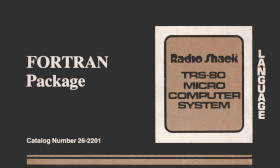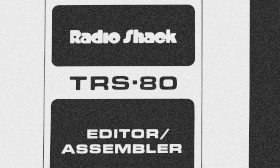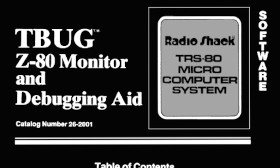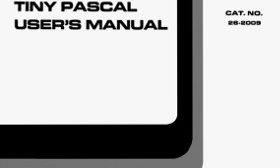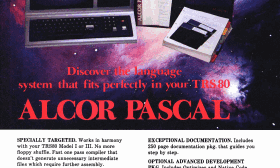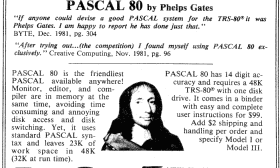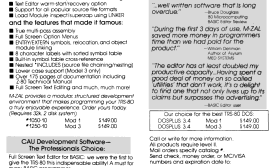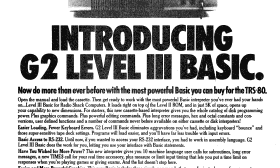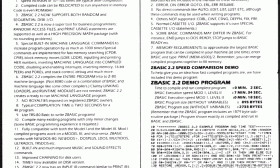Articles in the "Programming" Category
Microsoft FORTRAN, also known as FORTRAN-80, was one of the most advanced programming tools available for the TRS-80. As a compiled language, it was more powerful than the included BASIC interpreter. Microsoft FORTRAN was created and sold by Microsoft for multiple TRS-80 models, although the most popular versions were sold directly by Radio Shack. Many commercial TRS-80 programs, such as The Mean Checkers Machine by Lance Miklus, were written in FORTRAN. Miklus wrote in the March 1980 issue of The S-Eighty:
FORTRAN’s advantages are numerous: it’s fast, the coding technique is protected, it has powerful library functions, it is an excellent number cruncher, its functions are complete subroutines instead of single lines, and it interfaces easily with machine language subroutines.
(Read more...)
The TRS-80 Editor/Assembler (catalog number 26-2002), better known as EDTASM, was an assembly language programming tool for the cassette TRS-80 Model I. It was introduced in 1978 and cost $29.95. EDTASM was such a common tool that its name (and associated file format) became a kind of shorthand for TRS-80 assembler.
EDTASM was written by Mark Chamberlin of Microsoft and licensed to Radio Shack. A Radio Shack catalog stated:
Microsoft, an industry leader in systems software, has developed this program … so you can expect the ultimate in editing features.
(Read more...)
T-BUG (catalog number 26-2001), also known as TBUG, was a machine language monitor and debugger for the TRS-80 Model I. It cost $14.95 and came on a cassette with separate versions for Level I and Level II BASIC. (The T-BUG debugger shouldn’t be confused with the Tandy Business Users Group, which was also known as T-BUG.)
Described by some as the “standard” TRS-80 debugger, T-BUG provided an inexpensive way for TRS-80 owners to learn about and experiment with assembly language. Most books about TRS-80 assembly language, such as Earles L. McCaul’s TRS-80 Assembly Language Made Simple and William Barden’s TRS-80 Assembly Language Programming, assumed that the reader owned T-BUG.
(Read more...)
Tiny Pascal, also known as “Tiny” Pascal, was a popular programming language for microcomputers. It was created by Kin-Man Chung and Herbert Yuen in 1978 and first described in a three-part series of articles published in BYTE. There were at least four different versions of Tiny Pascal for the TRS-80, although the version sold by Radio Shack was the most popular.
Tiny Pascal was a subset of the programming language Pascal. It contained most of the features of Pascal but was small enough to run well on a cassette-based TRS-80. Tiny Pascal was often used to teach Pascal programming and the Radio Shack catalog described it as a “great introduction to structured programming.”
The first version of Tiny Pascal appeared in a three-part series of articles in BYTE titled “A ‘Tiny’ Pascal Compiler.”
(Read more...)
In the early days of microcomputers, many considered learning Pascal to be the logical next step for beginning programmers after learning BASIC. Alcor Pascal, sold by Alcor Systems of Garland, Texas, was a “complete Jensen and Wirth Standard Pascal” and a popular choice for TRS-80 users who wanted to expand their programming horizons.
In addition to the TRS-80 versions (which cost $199.00), Alcor Systems also sold Alcor Pascal versions for CP/M (including the Apple II with the Microsoft CP/M SoftCard) and later on for MS-DOS computers. Starting in 1983, Radio Shack began selling licensed versions of Alcor Pascal for the Model I/III (catalog number 26-2211) and the Model 4 (catalog number 26-2212). Both versions cost $249.95
Alcor Pascal had its origins in 1978 as a Pascal compiler for CP/M systems, a history that was detailed in the first issue of the Alcor Systems Newsletter in 1982:
(Read more...)
Pascal 80 was a Pascal development system for the TRS-80 Model I, III, and 4. It was written by Phelps Gates, also the author of APL-80, an APL compiler for the TRS-80.
The Pascal 80 package consisted of a full-screen text editor, monitor, and compiler. Pascal source code could be compiled directly to memory or to disk. Editing and compiling Pascal source code in memory made programming Pascal similar to using interpreted languages, such as BASIC. According to the Pascal 80 manual:
Efficient and compact code allows Pascal 80 to have a monitor, editor, and compiler in the computer at the same time, yet leave enough room to create programs up to 23K bytes, with an additional 9K available while the program is running for variables and work space. This allows programs to be written, compiler, edited, and compiled again without time consuming disk access.
When written to disk, resulting programs could either be created as p-code (an intermediate compiled format) or could be merged into standalone /CMD files.
(Read more...)
M-ZAL was a powerful disk-based editor assembler system for the TRS-80 Model I and III. First introduced in 1981, M-ZAL (which stood for Modular Z80 Assembly Language) was written by Jeffrey Krantz and David Willen. It was sold by Computer Applications Unlimited (also known as CUA) for the price of $149.95.
Although expensive, M‑ZAL was one of the most advanced assemblers ever written for the TRS-80 and it was used by many professional TRS-80 developers. The advertisements contained endorsements from several TRS-80 authors, including:
(Read more...)
Level III BASIC was an enhanced version of Level II BASIC for the TRS-80 Model I. It was created by Microsoft, also the authors of Level II BASIC, but sold by GRT Corporation on cassette for $49.95. Level III BASIC was said to be the first consumer product from Microsoft, which had previously sold only to manufacturers.
Rather than sell Level III BASIC directly to consumers, Microsoft decided to release it through GRT Corporation in 1978. GRT Corporation, which stood for Great Records and Tapes, was a music company that had expanded into the software business. The GRT software division, named G2, was started by Vern Raburn and Level III BASIC was sold under the G2 label.
The Level III BASIC manual contains this surprising statement of authorship:
(Read more...)
ZBASIC is probably the most popular BASIC compiler ever written for the TRS-80. It holds the distinction of being one of the few programs originally created for the TRS-80 that is still being developed in some form.
The first version of ZBASIC was written in 1979 by Andrew Gariepy for the Model I and sold by Simutek Computer Products. ZBASIC began appearing in Simutek advertisements in 1980. It originally cost $99.00 for the tape version and $129.00 for the disk version.
ZBASIC fell somewhere between a traditional compiler and an interpreter. As an early advertisement described it:
(Read more...)
